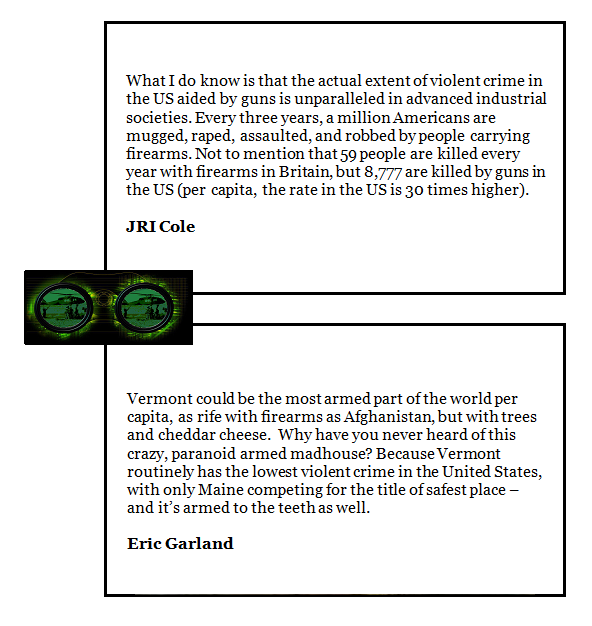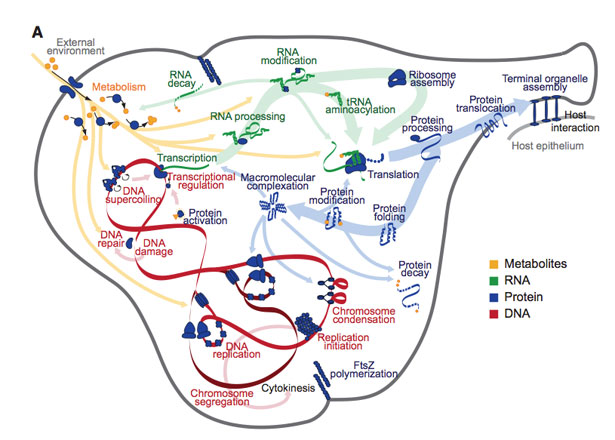Aurora, Samarra, Vermont…
[ By Charles Cameron — the gun issue, complexity, human beings being humans and the world we live in ]
.
As always, I’m a fence-sitter bridge-builder, not wanting to take sides, preferring to talk with them.
The irritating beauty of these two quotes is that either one taking separately might seem like a “case closed” argument in favor of guns or gun control — but taken together, they show the world to be a dappled place.
Here’s the lead-in to that Vermont quote:
One facet of Vermont life is neither famous nor quaint: Vermonters are armed to the teeth. Guns are absolutely everywhere. Rifles. Pistols. Shotguns. Muzzle-loaders. Semi-automatics. 50 caliber tripod-mount “semi” automatics that could take out aircraft. Every firearm you can possibly imagine. Vermont could be the most armed part of the world per capita, as rife with firearms as Afghanistan, but with trees and cheddar cheese…
Things are weird that way: just when you think you’ve got them figured out, there’s an exception to the rule… a black dot in the white part of the yin-yang symbol… an anomaly that challenges the easy paradigm.
Dappled, as Hopkins puts it.
**
Pied Beauty
by Gerard Manley Hopkins, SJ
.GLORY be to God for dappled things—
For skies of couple-colour as a brinded cow;
For rose-moles all in stipple upon trout that swim;
Fresh-firecoal chestnut-falls; finches’ wings;
Landscape plotted and pieced—fold, fallow, and plough;
And áll trádes, their gear and tackle and trim.All things counter, original, spare, strange;
Whatever is fickle, freckled (who knows how?)
With swift, slow; sweet, sour; adazzle, dim;
He fathers-forth whose beauty is past change:
Praise him.
**
The world is complex: scientists using microscopes and a suite of 128 computers recently (and triumphantly) managed to simulate the genome of one of the smallest micro-organisms in the world, Mycoplasma genitalium (neat name, that):
Alexis Madrigal (another neat name, btw) writes:
“Right now, running a simulation for a single cell to divide only one time takes around 10 hours and generates half a gigabyte of data,” lead scientist Covert told the New York Times. “I find this fact completely fascinating, because I don’t know that anyone has ever asked how much data a living thing truly holds.”
One cell. One division. Half a gig of data. Now figure that millions of bacteria could fit on the head of a pin and that many of them are an order of magnitude more complex than M. genitalium.
Yup. So think how complex the world is. No wonder we name things, divide stuff up into categories — use quite a large chunk of our brains for making distinctions.
But then think how complex the humans studying M. genitalium (still like that name, but this’ll be the last time I mention it) themselves must be… As Madrigal (really a nice name, you can almost sing it) goes on to point out:
Or ponder the idea that the human body is made up of 10 trillion (big, complex) human cells, plus about 90 or 100 trillion bacterial cells. That’s about 100,000,000,000,000 cells in total. That’d take a lot of computers to model, eh? If it were possible, that is.
**
Complexity looks at complexity with a view to modeling it. Simple, you think? Complex, you’d say?
The world’s a subtle place, and I might just go live in Vermont.
But people get shot in Vermont too, from time to time — there’s always a black and bleeding bullet-hole in the white half of the yin yang symbol — this world is hopelessly dappled.
And you know that story Somerset Maugham tells about Samarra?
There was a merchant in Bagdad who sent his servant to market to buy provisions and in a little while the servant came back, white and trembling, and said, Master, just now when I was in the marketplace I was jostled by a woman in the crowd and when I turned I saw it was Death that jostled me. She looked at me and made a threatening gesture, now, lend me your horse, and I will ride away from this city and avoid my fate. I will go to Samarra and there Death will not find me. The merchant lent him his horse, and the servant mounted it, and he dug his spurs in its flanks and as fast as the horse could gallop he went. Then the merchant went down to the marketplace and he saw me standing in the crowd and he came to me and said, Why did you make a threating getsture to my servant when you saw him this morning? That was not a threatening gesture, I said, it was only a start of surprise. I was astonished to see him in Bagdad, for I had an appointment with him tonight in Samarra.
Idries Shah tells a version of the same story as “When Death Came to Baghdad” in his Tales of the Dervishes, but with Samarkand rather than Samarra as the fatal destination.
It just might be the same with Vermont.





July 24th, 2012 at 10:50 pm
If you guys had tried to take my piece as a polemic for one policy or another, I would have been disappointed. But as you saw my real point of complexity, tragedy, and the human condition – you got it exactly right. Bravo.
July 25th, 2012 at 4:34 am
Comparing the United States of America with the United Kingdom of Great Britain and Northern Ireland is pointless. The United Kingdom is a small sunless island off the shore of the European subcontinent with a relatively ethnically homogeneous population around 60 millionish. The United States is a continental empire of 300 million or so people, many of whom are descendants by blood or adoption of the same unruly people the United Kingdom expelled to make itself a peaceable kingdom with a relatively ethnically homogeneous population. It’s like comparing a poodle with a tyrannosaur.
July 25th, 2012 at 5:22 am
Heh. As one who has made the trek myself, I have long favored the notion that the Brits who came to the States were the most “excited” molecules, leaving the ones who couldn’t quite make the transition from metaphorical water to metaphorical steam behind…
.
Digging a little deeper into the juxtaposition of Cole and Garland, though, I think the most intriguing suggestions in the Garland piece are:
and:
Gun laws are not a particular issue of mine, but subtlety in response to complex situations is — and IMO, those formulations are beginning to get subtle enough to encourage interesting deliberative thought…
July 25th, 2012 at 1:36 pm
The main use of firearms I’ve seen here is shooting animals, either for sport or homestead protection. The latter is why we’ve looked into it, fending off coyotes and bears.
.
Terrific use of Hopkins, btw.
July 25th, 2012 at 11:19 pm
For the general information of ZP readers — Bryan homesteads in Vermont, and blogs at Infocult: Uncanny Informatics.
July 27th, 2012 at 12:40 am
I was quite surprised to see my native Vermontistan pop up here. I have returned home this year and I’ve been spending a lot of time unloading magazines off my the back porches of my friends mountain homes. It’s also interesting synchronicity in that I’ve had dozens of people email me a newspaper article today about how my old D.A.R.E. officer Phil Ciotti got robbed of a gun in 2003 — and that precise firearm wound up killing a high school quarterback in Boston four years later.
I’m definitely a fence-sitter, too. I appreciate why cops in Boston are bitter about Vermont gun laws, but at the same time, this isn’t about gun laws at all. It’s about quality of life. People in Boston are shooting each other because they have no options, no stake in society, no future. Nobody is seriously addressing that and most of those social problems are going to get worse in the next decade.
Vermont isn’t crime-free. We have sick people doing horrible things here. They’re usually rural poor, they’re usually hooked on (legal, prescription) drugs, and they’re coming from the exact same mentality as any kid with a glock and grudge in Boston.
So hey, maybe I’m not a fence-sitter: the problem with our technology is us. Always has been. That’s true for computers, money, guns and genitalia. Probably a few other things besides.
July 29th, 2012 at 4:01 am
So hey, maybe I’m not a fence-sitter: the problem with our technology is us. Always has been. That’s true for computers, money, guns and genitalia. Probably a few other things besides.
Some wag or another pointed out, a few days after the Aurora shootings, that this month alone Chicago had seen a mass-murder twice as bad as that in Aurora – the difference being the killings were spread over a few weeks. And all in spite of tight gun controls, and in spite of decades of almost uniform control by enlightened liberal Democrats. Which is both a cheap shot and true (the most devious kind of cheap shot).
Anyway. Many of the most passionate advocates for gun control in the U.S. are urban Democrats from cities that have serious problems with gun violence, and that also happen to have been run by urban Democrats for, in some places, half a century or more. So the appeals for even more gun control from such people looks to me suspiciously like distractive hand-waving. As though there is something wrong other than guns themselves, and that maybe it’s them.
July 29th, 2012 at 4:15 am
Chicago street gangs like the Black Gangster Disciples and the Latin Kings have replaced the Chicago Outfit associates like John D’Arco of the (abolished) old 1st Ward (Sam “Momo” Giancana’s ward) as get-out-the-vote hustlers for many a seedy Alderman who voted in lockstep for Daley and now for Rahm. Gang warfare proliferates in Chicago now because clout offers gang leaders protection from a strategic use of police power, up to a point. As long as poor, minority, nobodies are the victims of drive-by shooting sprees and no “red lines” for the Feds are crossed (like the El Rukns foolish engagement with Gaddafi in the 80’s) or a national media frenzy does not occur, the gangs are relatively free to engage in mayhem. Far more than a decade ago
August 1st, 2012 at 3:22 pm
[…] at Zenpundit have an amazing mix of history, national security, poetry and humanity going. This is what they saw of the gun debate – comparing my contribution with noted Middle East security scholar Juan Cole: The irritating […]
August 27th, 2012 at 3:26 pm
^^That connection is news to me. Thanks for kinda blowing my mind and reminding me to keep studying up on gang history.